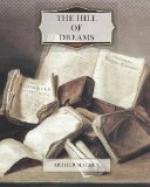that the held and possessed all the loveliness that
had so long moldered. He could scarcely fall
asleep for eager and leaping thoughts, and as soon
as his breakfast was over he went out and bought paper
and pens of a certain celestial stationer in Notting
Hill. The street was not changed as he passed
to and fro on his errand. The rattling wagons
jostled by at intervals, a rare hansom came spinning
down from London, there sounded the same hum and jangle
of the gliding trams. The languid life of the
pavement was unaltered; a few people, un-classed,
without salience or possible description, lounged
and walked from east to west, and from west to east,
or slowly dropped into the byways to wander in the
black waste to the north, or perhaps go astray in
the systems that stretched towards the river.
He glanced down these by-roads as he passed, and was
astonished, as always, at their mysterious and desert
aspect. Some were utterly empty; lines of neat,
appalling residences, trim and garnished as if for
occupation, edging the white glaring road; and not
a soul was abroad, and not a sound broke their stillness.
It was a picture of the desolation of midnight lighted
up, but empty and waste as the most profound and solemn
hours before the day. Other of these by-roads,
of older settlement, were furnished with more important
houses, standing far back from the pavement, each
in a little wood of greenery, and thus one might look
down as through a forest vista, and see a way smooth
and guarded with low walls and yet untrodden, and
all a leafy silence. Here and there in some of
these echoing roads a figure seemed laxily advancing
in the distance, hesitating and delaying, as if lost
in the labyrinth. It was difficult to say which
were the more dismal, these deserted streets that wandered
away to right and left, or the great main thoroughfare
with its narcotic and shadowy life. For the latter
appeared vast, interminable, grey, and those who traveled
by it were scarcely real, the bodies of the living,
but rather the uncertain and misty shapes that come
and go across the desert in an Eastern tale, when
men look up from the sand and see a caravan pass them,
all in silence, without a cry or a greeting. So
they passed and repassed each other on those pavements,
appearing and vanishing, each intent on his own secret,
and wrapped in obscurity. One might have sworn
that not a man saw his neighbor who met him or jostled
him, that here every one was a phantom for the other,
though the lines of their paths crossed and recrossed,
and their eyes stared like the eyes of live men.
When two went by together, they mumbled and cast distrustful
glances behind them as though afraid all the world
was an enemy, and the pattering of feet was like the
noise of a shower of rain. Curious appearances
and simulations of life gathered at points in the road,
for at intervals the villas ended and shops began
in a dismal row, and looked so hopeless that one wondered
who could buy. There were women fluttering uneasily




